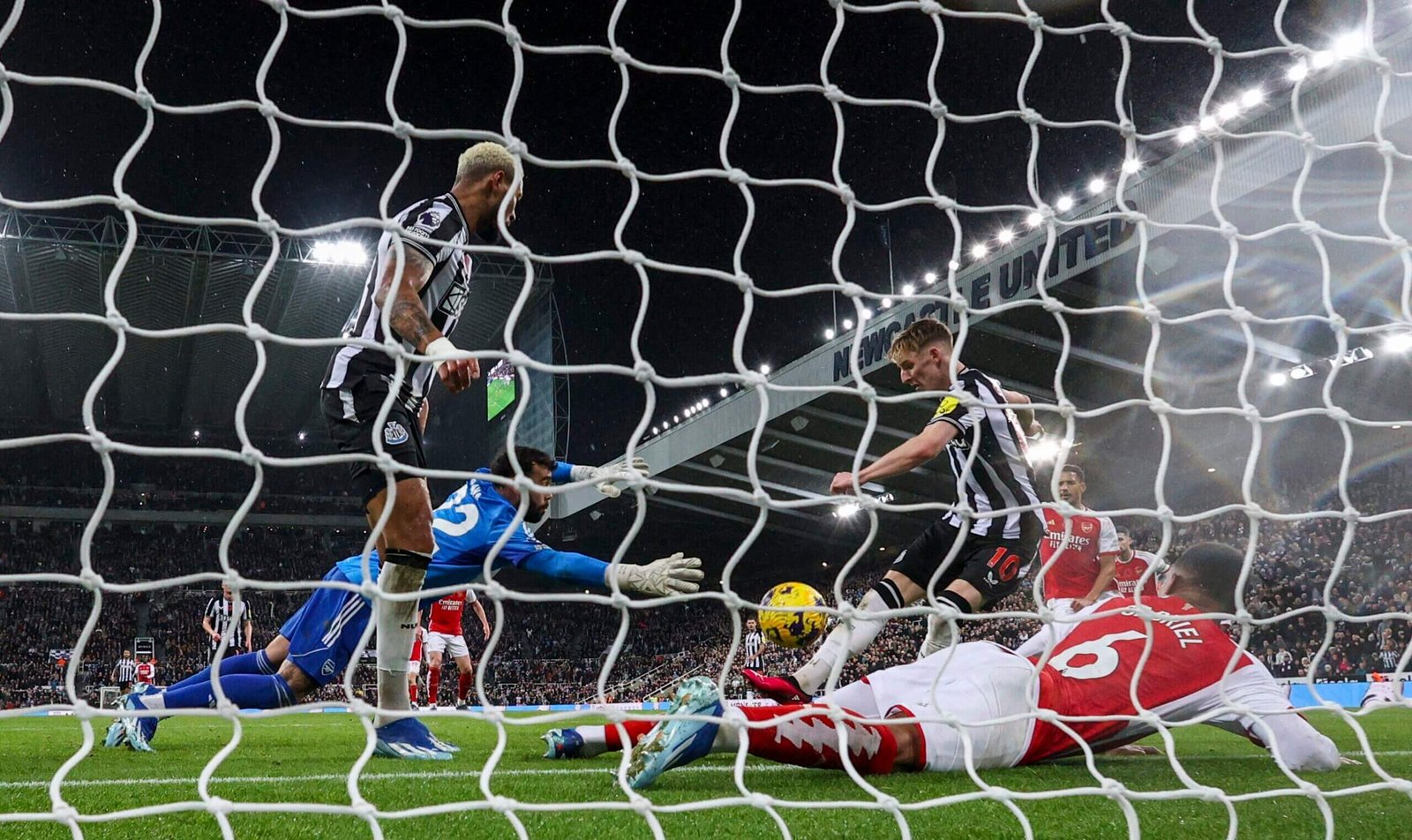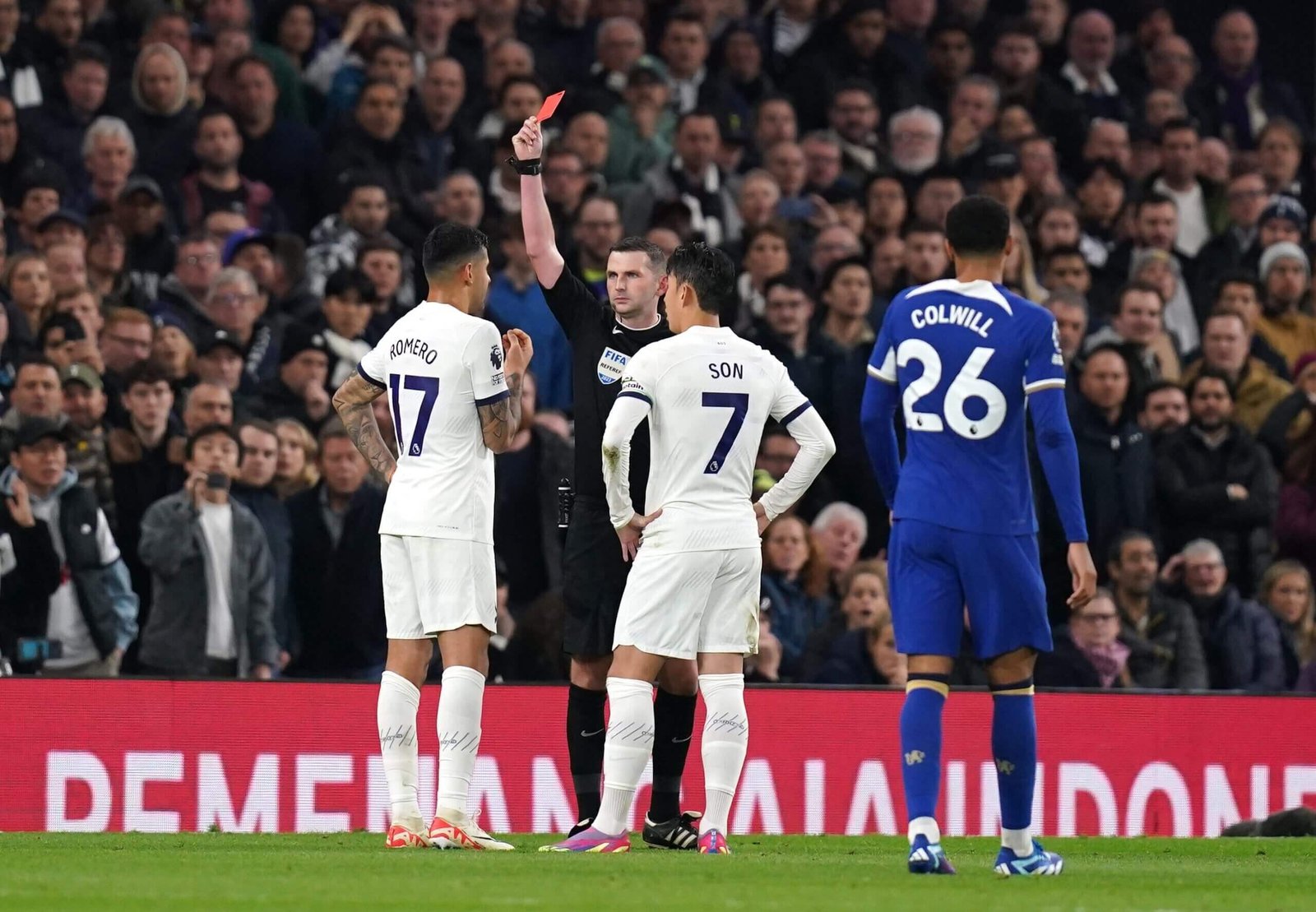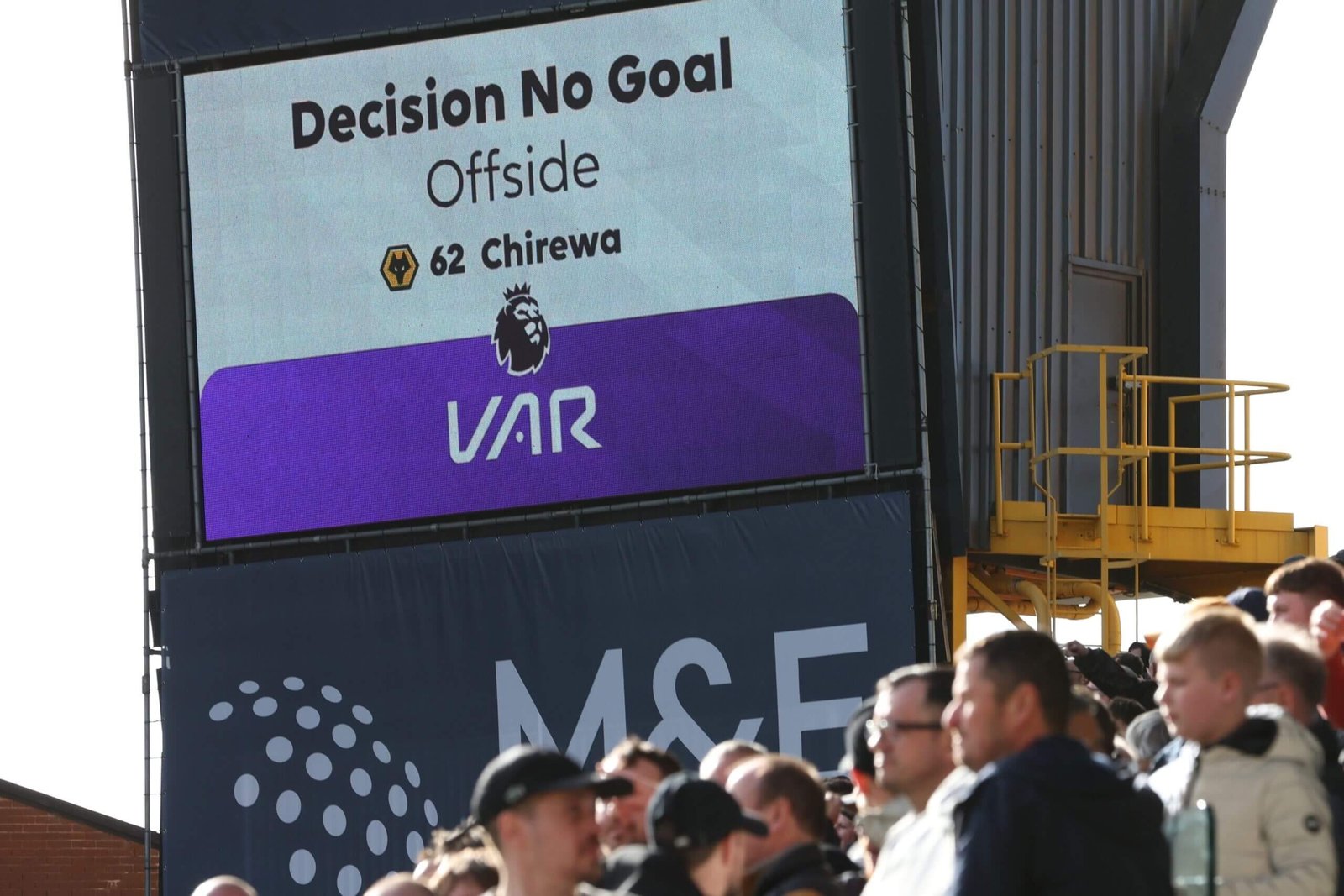Premier League clubs are set to hold a vote at their general meeting next month on whether to get rid of the video assistant referee (VAR) system, as revealed by The Athletic.
VAR has been used in England’s top flight since the start of the 2019-20 campaign and, despite making numerous correct decisions and helping on-field officials make difficult calls, has been the source of almost weekly controversy over the last five seasons due to its own errors and the lengthy delays.
Here, The Athletic details some of the most controversial and notable VAR decisions that have taken place this season which have led to discontent among clubs — notably Wolves, who tabled the proposal to scrap VAR.
In the opening round of matches in the 2023-24 Premier League season, Manchester United goalkeeper Andre Onana — who was making his debut for the club — came for a cross in second-half added time against Wolves but got nowhere near the ball and clattered into striker Sasa Kalajdzic inside the penalty area.
Onana collides with Kalajdzic (Robbie Jay Barratt – AMA/Getty Images)
United, who were winning 1-0 despite having been outplayed for most of the game, feared the worst as Onana’s flailing arms and hands clearly struck the Austrian in the head and neck, and left him on the floor.
However, VAR Michael Salisbury reviewed the incident and decided that no penalty should be awarded — infuriating the visitors’ boss Gary O’Neil, who was booked for dissent shortly afterwards.
O’Neil later said that Professional Game Match Officials Limited (PGMOL) official Jon Moss had apologised to him for the mistake. He said: “We have just spoken to Jon Moss and fair play to him for coming straight out and apologising and saying it was a blatant penalty and should have been given.”
All of the officials who worked on the game were not selected for the following weekend’s round of fixtures.
Arsenal vs Manchester United, September 3
With the match ticking towards added time and the scores level at 1-1, Casemiro played Alejandro Garnacho through on goal and the Argentinian beat Aaron Ramsdale to seemingly hand Manchester United victory.
The flag wasn’t raised on the pitch but after a VAR check by Jarred Gillett, it was ruled that Garnacho was, by a tiny margin, offside — with Arsenal defender Gabriel remarkably sucking his stomach in at the crucial moment.
Arsenal went on to score twice and win 3-1 and, despite United boss Erik ten Hag fuming that: “It was not offside. It was the wrong angle”, PGMOL chief Howard Webb said it was the correct decision.
Webb said: “It’s a clear offside situation, the technology was used quite rightly from the calibrated cameras to identify Garnacho was ahead of Gabriel and the goal was quite rightly disallowed after initially being awarded on the field.”
Luis Diaz thought he had put Liverpool ahead in north London when he ran onto Mohamed Salah’s pass and found the bottom corner with a superb finish.
However, the on-field officials ruled that the Colombian had been in an offside position when Salah played the ball to him. VAR checked the goal and, very quickly, the message came through that the original decision was the right one.
Yet while the correct procedure was followed by the VAR team, the wrong message was sent to the on-field officials. ‘Check complete’ was signalled, when there should have been an intervention to inform the referee that the decision made on the pitch was wrong and that a goal should be awarded.
This was due to a breakdown in communication among the VAR team where they seemingly forgot what the initial decision had been. They knew after seeing the replays and drawing the lines that Diaz was onside, but they inexplicably communicated the opposite to the on-field officials.
The fall-out was enormous and PGMOL admitted that ‘significant human error occurred’ and released the audio from the incident.
Tottenham went on to win the match 2-1, with Liverpool having two players sent off. Jurgen Klopp called for the game to be replayed, something that, unsurprisingly, didn’t happen.
The VAR officials — Darren England and his assistant Daniel Cook — were stood down for several matches afterwards before returning to duty in mid-October.
Arsenal’s first defeat in the Premier League this season came after a night of VAR controversy in Newcastle.
Anthony Gordon scored the only goal of the game in the 64th minute, but its legality was only confirmed following a lengthy check at Stockley Park by VAR Andy Madley to determine whether the ball had gone out of play, if a foul had been committed and, finally, if it was offside.

Gordon’s controversial goal against Arsenal (Alex Dodd – CameraSport via Getty Images)
Arsenal manager Mikel Arteta didn’t hold back after the match, saying: “It is not acceptable. We didn’t deserve to lose the match. We lost the match because of the clear and obvious decisions. It’s embarrassing. A disgrace. That’s what it is — a disgrace. You cannot imagine the amount of messages I got saying this cannot continue. I am wasting my time. We are wasting our time. I don’t want to be in the hands of people.”
The Premier League’s Key Match Incidents Panel — which is independent and consists of three former players/coaches, one person from the Premier League and one from PGMOL — said afterwards that it was correct to allow the goal to stand, but that the officials and VAR missed two red cards during the game.
Arsenal’s Kai Havertz should have been sent off for a foul on Sean Longstaff and Newcastle’s Bruno Guimaraes’ elbow on Jorginho also warranted a dismissal.
Listen to the full four minute VAR check of Anthony Gordon’s controversial goal for Newcastle against Arsenal and PGMOL chief Howard Webb discussing the process of awarding the goal 🔊 pic.twitter.com/f0wGwsPqhE
— Sky Sports Premier League (@SkySportsPL) November 14, 2023
Tottenham Hotspur vs Chelsea, November 6
Tottenham’s Cristian Romero was shown a red card after 33 minutes against Chelsea in early November, following a rash challenge on Enzo Fernandez inside the penalty area with the score 1-0 to the hosts.
The sending-off was a result of referee Michael Oliver being called over to the pitchside monitor by VAR John Brooks and changing his mind following a clearer view of the incident.

Romero is sent off against Chelsea (John Walton/PA Images via Getty Images)
Cole Palmer scored the resulting penalty to equalise and Chelsea ran out 4-1 victors. Webb said it was the correct decision, commenting: “I know the check took some time but the VAR had to go through the process diligently and establish whether (Nicolas) Jackson was in an offside position, and if he was, have a look at what happened just before that with Romero going in on Enzo, which is ultimately what the penalty and red card were awarded for.”
Fulham vs Wolves, November 27
Wolves were left enraged by VAR once again following their added-time loss to Fulham in late November.
Marco Silva’s team were awarded a 59th-minute penalty when Wolves’ wing-back Nelson Semedo caught Tom Cairney in the area and VAR Stuart Attwell upheld the decision, despite replays suggesting Semedo had made some contact with the ball. Fulham’s Willian duly dispatched the penalty.
Then, in added time, referee Salisbury waved play on when Harry Wilson and Joao Gomes collided in the box. Shortly after, however, the official was called over to the pitchside monitor by VAR and he reversed his decision. Willian again scored from the spot to secure victory for Fulham.
Following the game, the Key Match Incidents Panel said that VAR got all the decisions correct, but it did little to ease Wolves’ frustration as they lost 3-2.
Liverpool vs Arsenal, December 23
With Liverpool trailing title rivals Arsenal 1-0 at Anfield just before Christmas, the visitors’ captain Martin Odegaard appeared to handle the ball very close to the floor inside his own penalty area following a touch from Salah.
Referee Chris Kavanagh did not point to the spot and VAR David Coote reviewed the passage of play and decided not to intervene. Liverpool came back to draw 1-1 but finished the game feeling that they had dropped two vital points.
The following month, Webb said that Liverpool should have been awarded a penalty for the incident.
Wolves vs West Ham, April 6
O’Neil’s team had an added-time equaliser disallowed against West Ham last month in controversial circumstances.
Tawanda Chirewa, who was in an offside position, was adjudged by VAR Tim Robinson to have impeded goalkeeper Lukasz Fabianski in the build-up to Max Kilman finding the net with a header, so the goal was ruled out by referee Tony Harrington.

Wolves’ disallowed goal against West Ham angered O’Neil (Matthew Lewis/Getty Images)
Afterwards, O’Neil said it was “possibly the worst decision I have ever seen” and the club’s chairman Jeff Shi questioned whether VAR is “really what football wants or needs”.
However, the Key Match Incidents Panel said afterwards that the ruling had been correct.
Nottingham Forest had three penalty appeals turned down at Goodison Park, with Everton’s Ashley Young involved in all of them.
First, the former England international clipped the heel of Gio Reyna in the box, then he appeared to handle a cross-shot from Callum Hudon-Odoi inside the area, before, finally, clattering into Hudson-Odoi as he received the ball in the box in the second half.
Referee Anthony Taylor rejected all three appeals and VAR Attwell did not intervene for any of them. This prompted Forest to release a furious statement on social media questioning Attwell’s integrity — a post that has been viewed more than 45 million times.
Three extremely poor decisions – three penalties not given – which we simply cannot accept.
We warned the PGMOL that the VAR is a Luton fan before the game but they didn’t change him. Our patience has been tested multiple times.
NFFC will now consider its options.
— Nottingham Forest (@NFFC) April 21, 2024
The Key Match Incidents Panel said that Forest should have been awarded one penalty during the game — with Young’s foul on Hudson-Odoi the incident in question.
Everton won the match 2-0 — a result that took them to the brink of safety and pushed Forest deeper into the relegation battle.
(Top photo: Ryan Pierse/Getty Images)
Read the full article here


